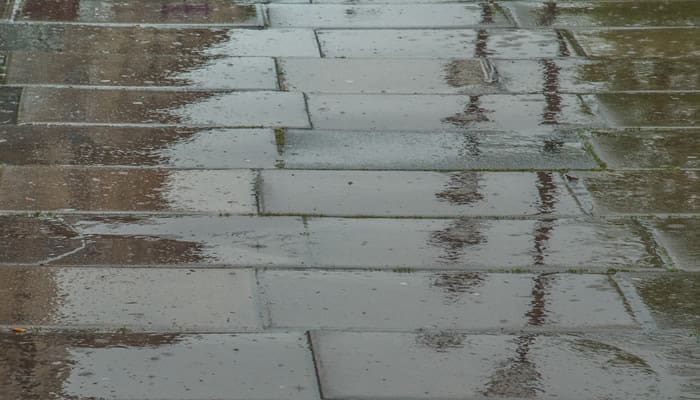Even if you check the forecast before sealing your brick pavers, the heavens may conspire against you and it can unexpectedly rain. While a light sprinkle may not ruin the look of the patio, but if it pours down, the results can be horrifying.
So What Happens If Your Sealant Gets Wet?
There are various types of sealants available and the drying time may vary according to the type and brand of the sealer. Residential paving usually takes three days on average to dry completely in summer months, and 5-6 days in winter months.
 Additives
Additives
Additives can help speed up the process of curing the sealant. If the chances of rain are high, ask the professionals sealing your patio to include additives. This can cut down the drying time from 3 days to 24 hours. The probability of your paver being ruined will decrease considerably.
What will happen if the sealant gets wet?
Acrylic-based sealants such as Polyurethane (PU), silane/siloxane and monofluoroethane sealants can be ruined if there is contact with water. If you experience any dew, accidental sprinkling of water or rain as the sealant dries, the sealant can become stained, cloudy, blotchy, or discolored and it will no longer be aesthetically pleasing.
Simply don’t seal your paver if there is even a remote chance of rain, fog, or a drizzle. Check the weather forecast for the next week and make sure that the chances of rain are as low as possible.
How to put it right? Using a solvent bath for brick pavers
If it still happens to rain unexpectedly, don’t apply more sealant over the ruined coat because this will make it even harder to fix it. Instead, use a solvent specifically for the type of sealant that you are using. Solvents can liquify the ruined coat of the sealant and will give you a fresh start. Call up the manufacturer of the sealant that you are using and ask them which solvent will be appropriate for the sealant.
After applying the solvent, mop or rinse it away. Wait a few days to let the paver dry since rain may have made its way through the porous brick pavers.
High-Pressure Water Jetting or Shot Blasting
It may be difficult to rinse away ruined sealant even after applying a solvent. Calling a professional high-pressure water jetting company to help you wash away the sealant can prove to be effective.
Replacing the Pavers
The solvent may fail to help you effectively remove the sealant in which case, high-pressure water jetting or shot blasting will not help in washing it away. In this case, you may have to replace the pavers that have been affected. Believe it or not, replacing the pavers can be cheaper than high-pressure water jetting!
Calling up brick paver sealing experts will help you get professional insight into the best strategy for fixing your ruined paver.



